- From Faith Current: “The Sacred Ordinary: St. Peter’s Church Hall” - May 1, 2023
- A brief (?) hiatus - April 22, 2023
- Something Happened - March 6, 2023
Commenter @Hologram Sam posted this interview in a comment thread a couple of days ago, but after reading it, I thought it was interesting enough to surface on the front page. There’s actually some freshness to the intro (who called Paul “the most Beatley Beatle of them all” and can I shake his/her hand?). This bit I found both fluid and fascinating because, well, what Beatlefan hasn’t wondered what in blazes do they do all day?:
“His touring routine is well established: breakfast, a workout, perhaps a massage, then meetings with his team. If the weather’s clement and security conditions are favourable, a bike ride around the locality of the hotel. If there’s water nearby, he might try to get out on it in a boat. [!!-MG] Today, he will rehearse with the band, then have a quiet early dinner with Nancy and a few friends from the touring party. Tomorrow’s soundcheck will be any time between 3pm and 4:30pm. Then, as show time approaches, he will retreat to his dressing room to watch trashy American TV. After the concert, a drink, dinner, bed. And up early to travel to Tokyo for the next show.”
And this string of words seemed, if you’ll forgive me, almost Dullbloggian:
“McCartney, I think, rather than an embarrassing uncle, is a sort of dad figure to pop culture, someone whose influence we can’t help but acknowledge, someone we admire – love, even, without always wanting to admit it – but also someone to criticise; someone whose minor faults are exaggerated and whose abundant qualities are diminished or overlooked.”
McCartney himself was on his game, too. For example, he compares the pleasure of singing his back catalog to “drowning. In the nicest possible way.”

Paul chills with British Esquire, 2015
On why he hasn’t retired: “I mean, I never really felt like, “Oh, I did good.” Nobody does. Even at the height of The Beatles. I prefer to think there’s something I’m not doing quite right, so I’m constantly working on it. I always was, we always were. I mean, look at John [Lennon], a mass of paranoia and worries about whether he’s doing it right. You only have to listen to his lyrics. I think that’s just artists in general.”
To which interviewer Alex Bilmes says, “They say happiness writes white.” Thunk, into the center.
ESQ: Many of your songs are autobiographical. One of the reasons they resonate is people know what they’re about: ‘Let it Be’, about your mum; ‘Maybe I’m Amazed’, about Linda. Are you thinking about those people when you play those songs? Isn’t it painful?
PM: No, not always. I’m really doing them just because they’re songs. I mean, when I do ‘Let it Be’ I’m not thinking about my mum. If there’s one thing I know it’s that everyone in that audience is thinking something different. And that’s 50,000 different thoughts, depending on the capacity of the hall. Obviously, when I do ‘Here Today’ as I do, that is very personal. That is me talking to John. But as you sing them you review them. So I go, [sings] “What about the night we cried?” And I’m thinking, “Oh, yeah: Key West”. We were all drunk. We’d delayed Jacksonville because of a hurricane. We got parked in Key West and we stayed up all night and we got drunk – “Let me tell you, man, you’re fucking great” – so I know that’s what I’m talking about. I know the night. I do think of that.
And this bit, made by McCartney’s details, which are especially amazing given how many times he’s been asked a version of this question. You know, this Paul McCartney guy? He’s simply much smarter than your average celebrity.
ESQ: Was fame all it was cracked up to be, when you found it?
PM: It sort of was really, yeah. Because part of what it’s cracked up to be is difficult as well as great. They’d warned that. I remember making a very conscious choice: “OK, we’re getting really famous now, you’ve got to decide, whether or not to go for it.” For some reason Marilyn Monroe came into my mind. Like: this could be horrible. It was actually after a trip to Greece. We weren’t famous in Greece, and I’d hung out with the hotel band and was chatting to them: “I’m in a band, too, you know? We’re called The Beatles.” And I got a glazed look from them. I thought, “This is OK, if the fame gets too much we can always come to Greece.” Then, of course, the next year it was like, “Oh, no, you’re famous in Greece, too. Oh, God.” And I remember thinking, “Do you want to do this or don’t you?” And it was, “I like it too much to stop.”
“I like it too much to stop.” Can you imagine the famously Honest Beatles, John and George, saying something so honest? Because of course they, too, liked it too much to stop. Even when John “stopped,” from 1975-80, he wasn’t really stopping. Stopping isn’t becoming the most famous recluse since Garbo — that’s just another kind of fame.
ESQ: We’re told the Sixties created a classless society. Is that true?
PM: No. I think it helped towards that. There was a very good period of hanging with anyone: musicians, painters, aristocrats, playwrights. Didn’t matter, really. I liked that about it. But I think ultimately the nobs still stayed on top. As long as Eton and Harrow are still there that’ll always be so.
And this:
ESQ: Not to diminish your achievements, but The Beatles’ success came at a very specific moment. Clearly, the world was ready for it. Could a band ever have that kind of impact again or has the culture changed too much?
PM: We don’t live in that culture any more, that’s true. We came out of a very rich period. But let’s not forgot, those four boys were fucking good. It wasn’t just to do with the period. You name me another group of four chaps, or chapesses, who had what The Beatles had. Lennon’s skill, intelligence, acerbic wit, McCartney’s melody, whatever he’s got, Harrison’s spirituality, Ringo’s spirit of fun, great drumming. We all played, which is pretty hard. You don’t get a lot of that these days. The noise we made was just those four people playing. We came at the right time. We wrote some pretty good stuff, our own material. We didn’t have writers. Could that happen again? I don’t know. I wish people well but I have a feeling it couldn’t.
It’s all good, and you should go read it — British magazines are just so much fucking better than American ones — but I’ll leave you with this: “I shouldn’t say this about Her Majesty but we, as schoolboys, we said, “Look at the fuckin’ heave on her!”
Paul McCartney is truly my type of guy.

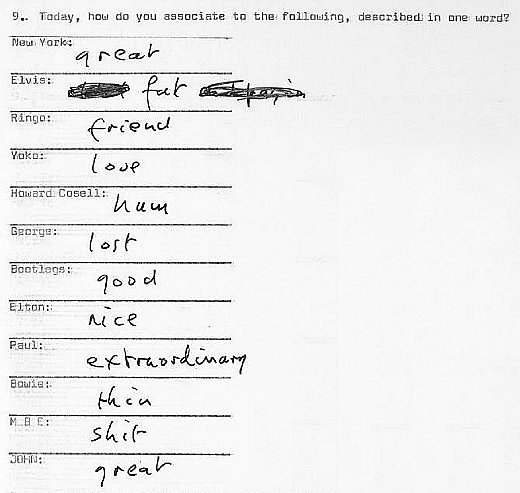
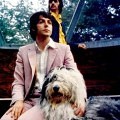
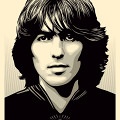

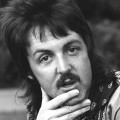
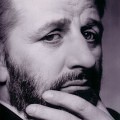
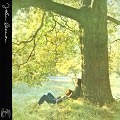
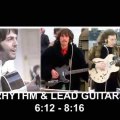
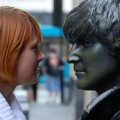

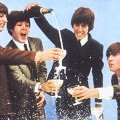
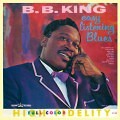
“Even at the height of the Beatles…”
Man, what must it be like, to think back on one of the most significant cultural events in modern human history, and say “oh yeah, that was me.”
The talent. The hysteria. The unstoppable juggernaut. On Anthology they show Harrison watching Beatlemania footage and saying “somebody should show Bono what superstardom really is.”
@Sir H F, it’s not just the scale of what happened to ’em that always gets me, it’s also the compression — “Please Please Me” to Abbey Road happened in roughly the span of the TV show “Mad Men.” Vast change in a very short time. It would be admirable to have simply stayed popular in that rapid shifting, like the Stones did. But to drive that shift, and to change two or three times in succession, always successfully…well, it’s just remarkable. It’s cosmic.
I’ve always wondered about Paul’s memories of “the night we cried” that he references in “Here, Today.” Every time Paul talks about it, he mentions that they were drunk, and the implication is that they were only able to say those things to each other: “I love you,” “I think you’re great,” because they were drunk, and sober Northern Men don’t say those things. But John was, by all accounts, not a soppy, sentimental drunk but a mean, acerbic and sometimes violent one. It seems odd to me that you would get this great outpouring of affection from a drunken John Lennon, but I’m not terribly familiar with the subject of alcoholism.
Sadly, I am, Ruth — addiction festoons my family tree like Spanish moss — and my experience is that you don’t know what you’re going to get. The alcohol will release a lot of emotion, but whether that’s happiness or sorrow or regret or anger is unpredictable. And the person can often cycle from one to the other very quickly. Love to regret to self-loathing to anger to sadness to love to… And this all happens in a very short time.
So that anecdote rings very, very true to me, and it’s not just the Northernness (which I have no experience with). That night in Florida sounds like a cathartic outpouring and declaration of undying fraternal love that’s completely typical of being in close quarters to an alcoholic. It’s the opposite of showing up to your 21st birthday party and beating the shit out of Bob Wooler.
Once again, this is only my observation based on the people I’ve been around, but there’s also a souring that happens with age; so while someone might’ve been generally happy when tipsy as a young person (24), by 34 or 40 or 50 that’s less prevalent and they grow dark when drunk. This is the difficulty with addiction — people do it because it works, at first. Then it works less and less. And the other thing that people seldom mention is how delightful some addicts can be when using. John Lennon was, I suspect, great fun to drink and smoke with, when he wasn’t an utter nightmare. If addiction just made you into a monster immediately, it would be less of a problem. It ruins you by degrees, and sometimes highlights the wonderful parts of you, and so for everybody watching there’s this terrible sense of “maybe things will get better” which is so hard to give up.
Just my 2c; the experience is as different as people.
Overall I found this interview quite refreshing.
Bits like this bugged: “One suspects an unsparing internal investigation would be launched inside Camp Macca were the boss ever to arrive anywhere unnoticed. How would Japan learn of his presence without a minor scuffle at the airport? What’s a rock star without a hyperventilating frenzy to follow him around?”
On what basis “one suspects” is never mentioned, so this comment reads like a gratuitous bit of snark. But with pieces written about McCartney, one takes what one can get, rather in the manner of accepting a dessert “without so much rat in it” in that Monty Python sketch.
I think it’s great that he said of fame that “I like it too much to stop.” I hope McCartney’s having as great a time touring as his shows suggest.
An artist created an unasked-for concert poster for Paul.
http://mitchoconnell.blogspot.com/2015/08/attention-paul-mccartney.html
I was happy that, out of the 27,876,542 Paul McCartney illustrations that exist, I actually came up with something new (I think)! I combined about 50 references in the drawing, a few obvious ones being the walking pose from Abbey Road, the profile from Revolver, the garb of Sgt. Pepper, the lettering from Magical Mystery Tour, and on and on and on, all rendered with a nod to Yellow Submarine.
PPS Paul, if you can use it, no charge.
Well, maybe 4 front row tickets couldn’t hurt!
Kind of late to the party, but when I read this article I had to chuckle at Paul’s unrelenting johnmentionitis–50 years later, and he STILL brings up John in interviews.
This on the tails of only mentioning Here Today as the song he feels emotional about while ignoring Maybe I’m Amazed (when the interviewer clearly refers to it) is telling.
Karen, that made perfect sense to me. With Linda he at least had some closure, and his emotional closeness to her was official and uncontested. His closeness to John was much more fraught, and the possibility for resolving that relationship ended abruptly with John’s murder. So I can see why “Here Today” is the song that feels rawest to him.
True, that, although Paul did lose Linda prematurely, while both were still in the prime of their lives, and was admittedly overcome with guilt afterwards over things he regretted during the course of their marriage. Worthy of at least an occasional tear during performances, I would think.
But yet–it’s John he thinks about. It’s the song for John he mentions as the one which hits the heart. Not a reflection of his lack of love for Linda, but rather a barometer of his continued connection with the man who, to paraphrase Philip Norman, occupied his heart, soul and mind while he was alive and continues to do so even after his death.
@Karen, my impression of Paul’s life with Linda is that — though it ended much too soon — it was straight on, locked in, no bullshit, fully experienced. For all the years they had together and all the water that passed under the bridge, there’s a thwarted, “what-might-have-been” quality to John and Paul’s relationship, a sense that neither man really was able to address the friendship in a full way while both were still alive.
Some friendships are like that. That may have been why their collaboration was so thrilling…a sense of approaching each other from the oblique.
I think we’re saying the same thing, actually.
I’m assuming that it’s painful for Paul, at least on occasion, to sing Maybe I’m Amazed, for all the obvious reasons.
However, when the interviewer asked Paul about the pain he felt singing autobiographical material, referencing Linda, he ONLY mentioned the pain he feels singing Here Today. The pain of that loss–for all the reasons we’ve talked about–trumps all.
Alert! There’s a spam link in the first quotation